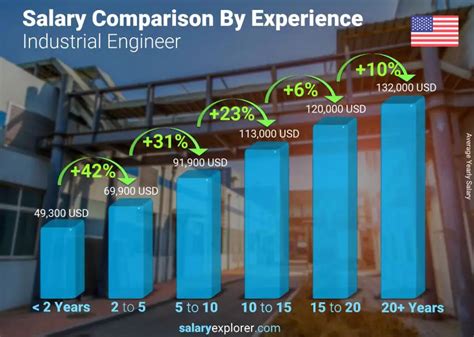Introduction

Industrial and systems engineering (ISE) is a multifaceted field that encompasses the design, improvement, and implementation of integrated systems to optimize efficiency and productivity. Professionals in this discipline leverage a combination of engineering principles, data analysis, and human factors to solve complex problems in various industries.
Salary Overview
According to the U.S. Bureau of Labor Statistics (BLS), the median annual salary for industrial and systems engineers was $91,410 in May 2021. The top 10% of earners in this field made more than $134,400, while the bottom 10% earned less than $56,380.
Factors Influencing Salary
Several factors influence the salary of an industrial and systems engineer, including:
- Education: Engineers with higher degrees, such as a master’s or doctoral degree, tend to earn higher salaries.
- Experience: Experienced engineers with proven expertise in specific industries command larger salaries.
- Industry: The salary of ISE professionals varies depending on the industry they work in. Those employed in high-paying industries, such as healthcare, finance, and manufacturing, typically earn more than their counterparts in other industries.
- Location: The cost of living in an area can impact salaries. Engineers working in metropolitan areas with higher living costs tend to earn more than those in smaller cities or rural areas.
- Size of Company: ISE engineers employed by large corporations generally earn higher salaries than those working for smaller organizations.
Table 1: Industrial and Systems Engineering Salary Percentiles
| Percentile | Salary |
|---|---|
| 10th | $56,380 |
| 25th | $73,260 |
| 50th (Median) | $91,410 |
| 75th | $112,450 |
| 90th | $134,400 |
Career Outlook
The BLS projects that the employment of industrial and systems engineers will grow by 10% from 2021 to 2031, faster than the average for all occupations. This growth is expected to be driven by the increasing demand for engineers to design and implement efficient and sustainable systems in various industries.
Strategies for Enhancing Salary Potential
- Obtain a Higher Degree: Pursuing a master’s or doctoral degree in industrial and systems engineering can significantly increase your earning potential.
- Gain Experience: Building a strong portfolio of experience through internships, co-ops, and work projects can enhance your value and qualifications.
- Develop Specialized Skills: Specializing in a particular area, such as healthcare engineering, aerospace engineering, or operations research, can make you more competitive in the job market.
- Join Professional Organizations: Joining professional organizations like the Institute of Industrial and Systems Engineers (IISE) provides networking opportunities, access to educational resources, and certification programs that can boost your credentials.
- Negotiate Salary: Don’t be afraid to negotiate a higher salary when accepting a new position. Be prepared to articulate your skills, experience, and market value.
Tips and Tricks for Success
- Be Data-Driven: Industrial and systems engineers rely heavily on data to make informed decisions. Develop strong data analysis and interpretation skills to stay ahead in the field.
- Embrace Collaboration: ISE professionals often work as part of teams with engineers from other disciplines, as well as managers and stakeholders. Cultivate strong communication and collaboration skills.
- Think Creatively: Innovative thinking is essential in industrial and systems engineering. Stay informed about emerging technologies and industry trends, and explore new ways to apply existing knowledge to solve problems.
- Leverage Technology: Utilize software tools and technologies to improve efficiency and productivity in your projects. Stay up-to-date with the latest advancements in engineering software.
- Pursue Continuous Education: The field of industrial and systems engineering is constantly evolving. Commit to ongoing professional development to stay ahead of the curve and expand your knowledge base.
Table 2: Salary Range by Education Level
| Education Level | Median Annual Salary |
|---|---|
| Bachelor’s Degree | $88,880 |
| Master’s Degree | $103,370 |
| Doctoral Degree | $122,840 |
Table 3: Salary Range by Industry
| Industry | Median Annual Salary |
|---|---|
| Manufacturing | $99,380 |
| Healthcare | $95,550 |
| Transportation | $93,240 |
| Finance | $92,650 |
| Technology | $91,050 |
Table 4: Salary Range by Job Title
| Job Title | Median Annual Salary |
|---|---|
| Industrial Engineer | $91,410 |
| Systems Engineer | $93,680 |
| Operations Research Analyst | $95,550 |
| Ergonomics Consultant | $97,610 |
| Process Improvement Engineer | $99,380 |
Conclusion
Industrial and systems engineering is a rewarding and lucrative career path that offers ample opportunities for growth and professional development. By leveraging the strategies outlined in this guide, you can maximize your earning potential and establish a successful career in this dynamic field.
